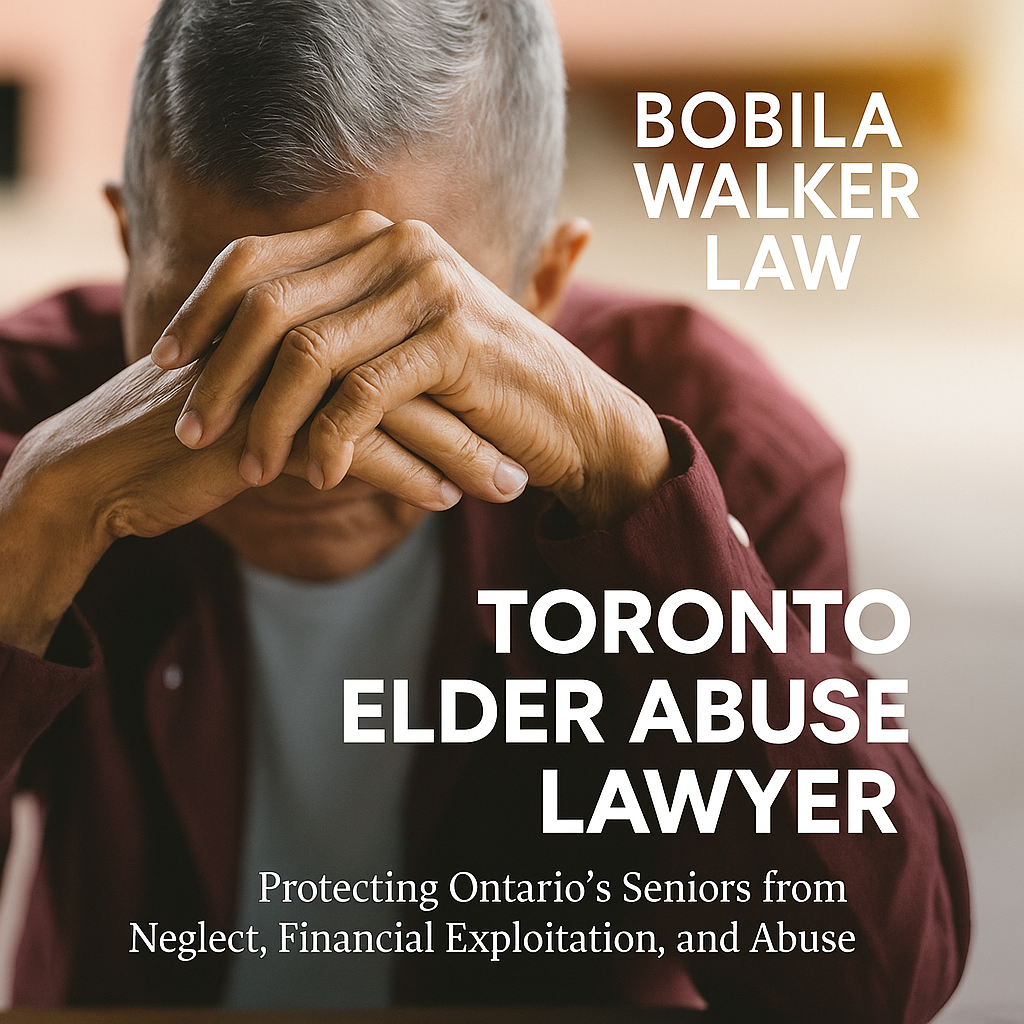Elder Abuse Toronto Lawyers – Bobila Walker Law LLP 100 King Street West, Suite 5600, Toronto, ON M5X 1C9 416-847-1859 | daniel@bobilawalkerlaw.com Published: November 2025
Elder abuse is a heartbreaking reality that affects thousands of seniors across Ontario every year, often hidden behind closed doors in homes, care facilities, or even among trusted family members. It can take many forms—physical harm, emotional manipulation, financial exploitation, or neglect—and its impact goes far beyond immediate injury, eroding a person’s dignity, health, and independence. As a society, we have a moral and legal duty to protect our elders, and Ontario’s laws provide powerful tools to recognize abuse, hold perpetrators accountable, and restore security for victims.
At Bobila Walker Law LLP, we have represented countless seniors and families in elder abuse cases, turning pain into protection through compassionate, strategic legal action. If you suspect abuse, know that help is available—and justice is possible.
Elder abuse is broadly defined under Ontario law as any action or inaction by a person in a position of trust that causes harm to an individual aged 65 or older, or sometimes younger adults with vulnerabilities. This includes family caregivers, spouses, friends, or professional caretakers in long-term care homes. Physical abuse might involve hitting, restraining, or overmedicating, leaving visible bruises or unexplained injuries. Emotional abuse is subtler but no less damaging—it could be yelling, isolation, humiliation, or threats that lead to anxiety, depression, or withdrawal. Financial abuse is rampant, often involving unauthorized withdrawals from bank accounts, forged signatures on cheques, or pressure to change wills, resulting in the depletion of life savings. Neglect occurs when basic needs like food, medication, hygiene, or medical care are ignored, sometimes unintentionally due to caregiver burnout but often willfully. Sexual abuse, though less commonly reported, is a severe violation that demands immediate intervention. These forms rarely occur in isolation; many victims endure a combination, compounding their trauma.
The statistics are sobering. According to the Ontario Network for the Prevention of Elder Abuse, one in ten seniors experiences abuse annually, with underreporting making the true number likely much higher. Financial exploitation alone costs Ontario seniors over $200 million yearly, per recent reports from the Ministry of Seniors and Accessibility. Vulnerable populations, such as those living alone, with dementia, or in low-income housing, face heightened risks. Abuse thrives in secrecy, fueled by the victim’s fear of retaliation, shame, or disbelief from authorities. That’s why early recognition is crucial—signs like sudden bank withdrawals, unexplained injuries, personality changes, or reluctance to see visitors can signal deeper issues. If you’re a family member noticing these red flags in a loved one, or if you’re a senior feeling trapped, the first step is acknowledging the problem without judgment.
Ontario’s legal framework for addressing elder abuse is robust and multifaceted, drawing from criminal, civil, and administrative laws to offer flexible remedies. Under the Criminal Code of Canada, physical or sexual abuse qualifies as assault, while financial exploitation can lead to charges of theft, fraud, or forgery—prosecutions handled by the Crown with potential penalties including jail time. The Adult Protective Services Act empowers social workers and police to investigate reports and remove victims from harm, often coordinating with hospitals for emergency assessments. For financial recovery, the Substitute Decisions Act allows for guardianship applications to freeze assets and appoint a protector, while tort claims under common law enable civil lawsuits for damages like pain and suffering or punitive awards against abusers. In long-term care settings, the Long-Term Care Homes Act imposes strict reporting duties on staff, with violations leading to fines up to $500,000 or license revocation by the Ministry. Recent 2025 amendments to the Elder Abuse Awareness and Prevention Strategy emphasize mandatory training for financial institutions and healthcare providers, making it easier to flag suspicious activities like large ATM withdrawals by non-account holders.
Reporting elder abuse is straightforward and protected—Ontario law shields whistleblowers from retaliation, and anonymous tips are welcome. Start with the police non-emergency line (dial 311 in Toronto) or 911 for immediate danger; they can initiate investigations and secure protective orders. For non-urgent cases, contact your local Adult Protective Services office through the Ministry of Children, Community and Social Services, or the specialized Elder Abuse Support Line at 1-866-299-1011, which offers 24/7 guidance in multiple languages. Financial institutions must report suspected exploitation under FINTRAC guidelines, and doctors are mandated reporters for suspected physical harm. Once reported, a multi-disciplinary team—often including social workers, lawyers, and geriatric specialists—assesses the situation, potentially leading to safety plans, restraining orders, or asset freezes. Victims can also self-refer to community programs like the Assaulted Women’s Helpline (1-866-863-0511) for emotional support, which extends to elder cases.
Preventing elder abuse begins with proactive planning and awareness. Encourage seniors to create powers of attorney for personal care and property while they’re capable, designating trusted individuals to monitor finances and health decisions. Regular family check-ins, joint bank account reviews, and home safety audits can catch issues early. Communities play a role too—volunteer visitor programs and education workshops, like those from the Canadian Network for the Prevention of Elder Abuse, build networks of support. For caregivers, respite services through Ontario’s Aging at Home program alleviate stress that might lead to unintentional neglect. Technology aids prevention as well: apps for remote medication reminders or video doorbells help isolated seniors stay connected. Ultimately, fostering a culture of respect—where elders’ voices are amplified—dismantles the isolation that abusers exploit.
Navigating elder abuse legally requires expertise, as cases often blend criminal urgency with civil strategy. At Bobila Walker Law LLP, our elder law team excels in these intersections, from securing emergency injunctions to litigating multi-million-dollar fraud recoveries. We’ve successfully represented victims in high-profile cases against family members and institutions, recovering assets and obtaining peace bonds to prevent further contact. Our approach is victim-centered: we start with a confidential intake to map out options, whether that’s a police report, civil suit, or guardianship filing. We collaborate with experts like forensic accountants to trace stolen funds and geriatric advocates to ensure holistic care.
You don’t have to face elder abuse alone—action today can safeguard tomorrow. If you or a loved one is experiencing harm, reach out immediately: call our office at 416-847-1859 for a free 15-minute consultation, or email our elder abuse lawyers directly at daniel@bobilawalkerlaw.com. We’re here to listen, advocate, and fight for justice with the compassion your family deserves.






